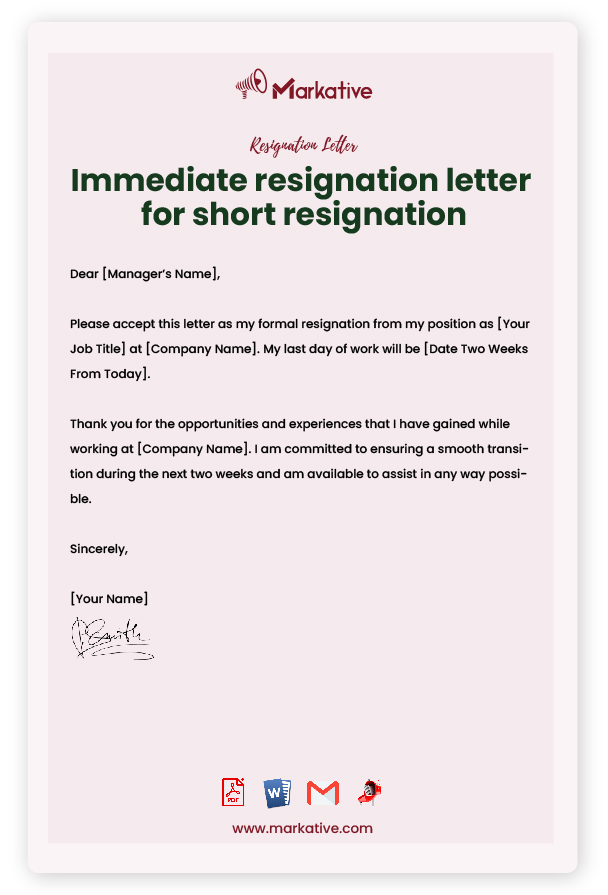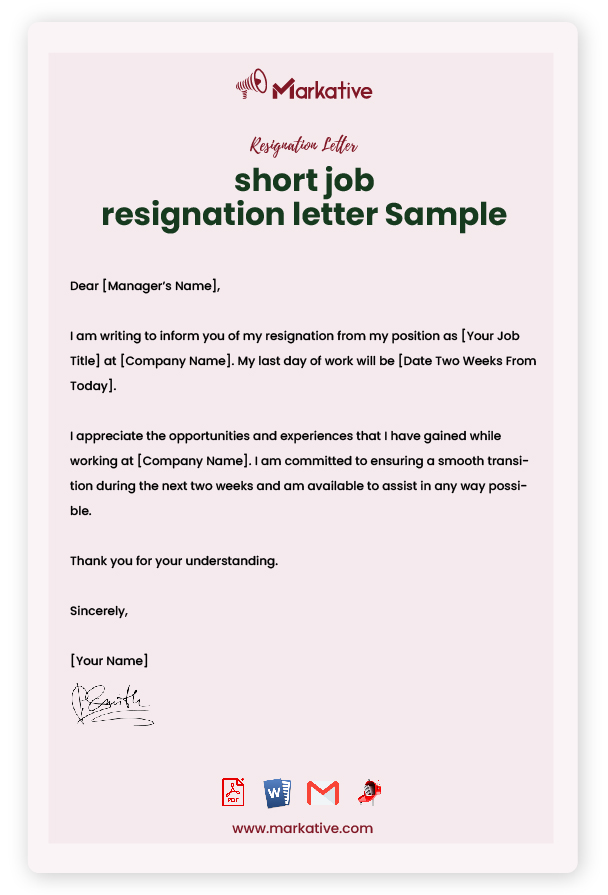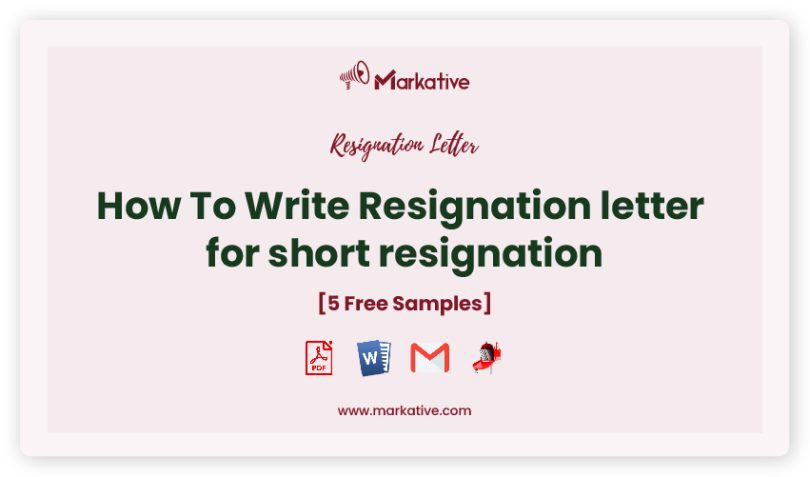Resigning from a job can be a difficult decision, but it is an important one. Whether you have been unhappy with your current position for some time or you have received a better offer, a resignation letter is a crucial part of the process. A well-written resignation letter can have a positive impact on your career and the relationship you have with your employer. In this article, we will explore why resignation is important, how a good resignation creates an impact, and provide tips on how to write a short resignation letter.
One of the most important reasons why resignation is essential is because it is a professional and courteous way to inform your employer that you will be leaving your position. Resignation is an opportunity to leave on a positive note and maintain a good relationship with your employer. It also allows your employer to plan for your departure and start the process of finding a replacement. Not resigning, or doing so improperly, can damage your reputation and future job prospects.
A good resignation letter can create a positive impact on your professional network, as well. A well-written letter demonstrates your professionalism, gratitude, and willingness to help make the transition as smooth as possible. This can go a long way in maintaining good relationships with your colleagues and superiors. A positive impression can lead to future job opportunities, references, or even partnerships. Therefore, it is crucial to write a resignation letter that leaves a lasting positive impact. In the next section, we will provide tips on how to write a short but effective resignation letter.
Are you unsure of how to write a resignation letter that leaves a positive impression? Do you know how to resign from your job professionally? Read on to discover why resignation is important, how a good resignation can create a lasting impact, and learn how to write a short but effective resignation letter. By the end of this article, you will have the knowledge and tools you need to resign from your job with confidence and professionalism.
How To Write Appealing Short Resignation Letter?
Writing a short resignation letter can be a challenging task, especially when you want to maintain a positive relationship with your employer. However, with the right approach, you can craft an appealing resignation letter that leaves a good impression.
Here are 5 steps on how to write an appealing short resignation letter with examples:
- Keep it simple and professional: Start by addressing your letter to your supervisor or HR manager and keep your tone formal and polite.
Example: Dear [Supervisor’s name],
- State your reason for resigning: Be honest but concise about why you’re leaving. You don’t need to go into too much detail but make sure your reason is clear.
Example: I regret to inform you that I have decided to resign from my position as [job title] effective [date], due to personal reasons.
- Express your gratitude: Thank your employer for the opportunity to work with them and express appreciation for the experience gained while working there.
Example: I am grateful for the opportunity to work for [company name] and for the support and guidance provided during my tenure.
- Offer to help with the transition: If possible, offer to assist with the handover of your responsibilities to ensure a smooth transition.
Example: I am willing to assist with the handover of my duties to my successor to ensure a smooth transition.
- Conclude on a positive note: End your letter on a positive and professional note, wishing the company continued success.
Example: Thank you once again for the opportunity to work with such a great team. I wish the company continued success in the future.
Conclusion: By following these simple steps, you can write an appealing short resignation letter that leaves a positive impression on your employer. Remember, it’s important to maintain a professional tone throughout and show gratitude for the experience gained during your tenure.

Sample Short Resignation Letter
Dear [Manager's Name], I am writing to inform you that I have decided to resign from my position as [Your Position] at [Company Name]. Please consider this letter as my formal notice of resignation, effective [Date of Resignation]. I would like to express my sincere gratitude for the opportunities that you and the company have provided me during my time here. I have learned and grown both personally and professionally, and I will always be grateful for the experiences I have had here. I will do my best to ensure a smooth transition during my remaining time here, and I am willing to assist in any way I can to make the transition as seamless as possible. Thank you again for everything, and I wish you and the company all the best in the future. Sincerely, [Your Name]
Professional Short Resignation Letter
Dear [Manager's Name], I am writing to inform you that I have decided to resign from my position as [Job Title] at [Company Name]. My last day of work will be [Date], which provides two weeks' notice as per company policy. I want to express my gratitude for the opportunity to work at this company and the valuable experience I have gained during my time here. It has been a pleasure working with my colleagues and contributing to the company's success. Please let me know if there is anything I can do to ensure a smooth transition during my remaining time here. I will work with you to ensure that all outstanding projects are completed and that I hand over all necessary documentation and materials to my replacement. Thank you again for the opportunity to work at [Company Name]. I wish the company and my colleagues all the best for the future. Sincerely, [Your Name]
For More: How To Write Best Resignation letter to manager [5+ Templates]
Short Resignation Letter with Notice Period
Dear [Manager's Name], I am writing to inform you that I am resigning from my position as [Your Position] at [Company Name]. My last day of work will be [Date of your last day of work], which fulfills the notice period of [Notice period as per your contract or company policy] as per my contract. I would like to express my gratitude for the opportunities and experiences that I have gained during my time at [Company Name]. I am grateful for the support and guidance provided by my colleagues and managers. It was a pleasure to work with such a wonderful team. Please let me know if there is anything I can do to help with the transition during my remaining time here. I am willing to assist in any way possible to ensure a smooth handover. Thank you for your understanding. Sincerely, [Your Name]
Short Resignation Letter without Notice Period
Dear [Manager's Name], I am writing to inform you that I am resigning from my position as [Job Title] effective immediately. I regret that I am unable to provide the customary notice period of [X weeks/months], but unforeseen circumstances have necessitated my departure. I want to express my sincere gratitude for the opportunities and experiences that I have gained during my time with [Company Name]. I have enjoyed working with my colleagues and appreciate all that I have learned from them. I will do everything in my power to ensure a smooth transition of my responsibilities, and I am available to provide any assistance necessary during this time. Thank you for your understanding. Sincerely, [Your Name]
For More: How To Write best Resignation letter for Teachers [5+ Free Samples]
Short Resignation Letter with Reason
Dear [Manager's Name], I am writing to inform you of my resignation from my position as [Job Title] at [Company Name], effective [Date]. After careful consideration, I have decided to resign from my role due to [Reason for Resignation]. This was not an easy decision to make, but I believe it is the right one for my personal and professional growth. I would like to thank you and the entire team for the opportunities and experiences that I have had during my time here. I am grateful for the support and guidance that I have received throughout my tenure. Please let me know what steps I need to take in order to ensure a smooth transition and to wrap up any outstanding projects. Thank you again for the opportunities and experiences, and I wish the company continued success. Sincerely, [Your Name]

How Much Notice Should You Give for a Short Resignation Letter?
According to the Bureau of Labor Statistics, the average length of employment for a worker in the United States is about 4.1 years. However, this number varies greatly depending on the industry and occupation. For example, workers in the healthcare and social assistance industry tend to stay with their employers for longer periods of time, with an average tenure of 7.8 years. On the other hand, workers in the accommodation and food services industry have an average tenure of just 2.3 years.
When resigning from a job, it is important to give your employer enough notice so that they have time to make arrangements for your departure. While two weeks’ notice is standard, the amount of notice you should give will depend on your specific situation. If you are leaving a job that you have held for a long time or if your position is difficult to replace, you may want to consider giving more than two weeks’ notice. On the other hand, if you are leaving for a job that starts immediately or if you are resigning due to a personal emergency, you may need to give less than two weeks’ notice. Ultimately, the amount of notice you give should be determined by what is practical and fair for both you and your employer.
For More: Best & Creative Professional Resignation Letter [5 Free Samples]
Is it Ok To Email a Short Resignation Letter?
It is generally not recommended to resign via email as it may come across as unprofessional and impersonal. However, in some circumstances, such as when the employee is working remotely or the employer has explicitly requested an email resignation, it may be acceptable. If you do decide to resign via email, it is important to keep the letter concise and professional. For example:
Dear [Manager's Name], I am writing to inform you that I have decided to resign from my position as [Job Title] effective [Resignation Date]. I have appreciated the opportunities and experiences I have gained while working at [Company Name], but I have decided to move on to pursue other career opportunities. Thank you for your understanding. Sincerely, [Your Name]
Common Mistakes When Writing a Short Resignation Letter?
Writing a short resignation letter can be a tricky task, as you need to convey your message in a concise and professional manner. Here are three common mistakes to avoid when writing a short resignation letter:
- Being too informal: Even if you have a good relationship with your employer, it’s important to maintain a professional tone in your resignation letter. Avoid using colloquial language or slang, and make sure to address your employer respectfully.
- Not providing enough information: While your resignation letter should be brief, it should also provide enough information to make your intentions clear. Be sure to include your intended last day of work and a brief explanation for your departure, such as pursuing another opportunity or personal reasons.
- Not expressing gratitude: Regardless of your reasons for leaving, it’s important to express gratitude for the opportunities you’ve had while working at the company. Thank your employer for the experience and the knowledge gained, and mention how you will use those skills in your future endeavors.
Remember, a short resignation letter should be polite, professional, and to the point. Avoid these common mistakes, and you’ll be on your way to a smooth and respectful departure.
For More: How To Write Resignation letter for personal reasons [5 Free Samples]
Conclusion:
Short resignation letter is a professional and courteous way to inform your employer that you are leaving the company. It is important to keep it brief, to the point, and free of negativity. Knowing when and where to send your resignation letter is also important, as it can affect your employment record and future references.
Common mistakes when writing a resignation letter include being too emotional or too vague, not giving enough notice, and not thanking your employer for the opportunities and experiences gained while working with them. To make the process easier, we have provided several free and ready-to-use templates that you can choose from to create your own resignation letter.
By following these guidelines and using our templates, you can ensure that your resignation letter is professional, respectful, and leaves a positive impression on your employer.







